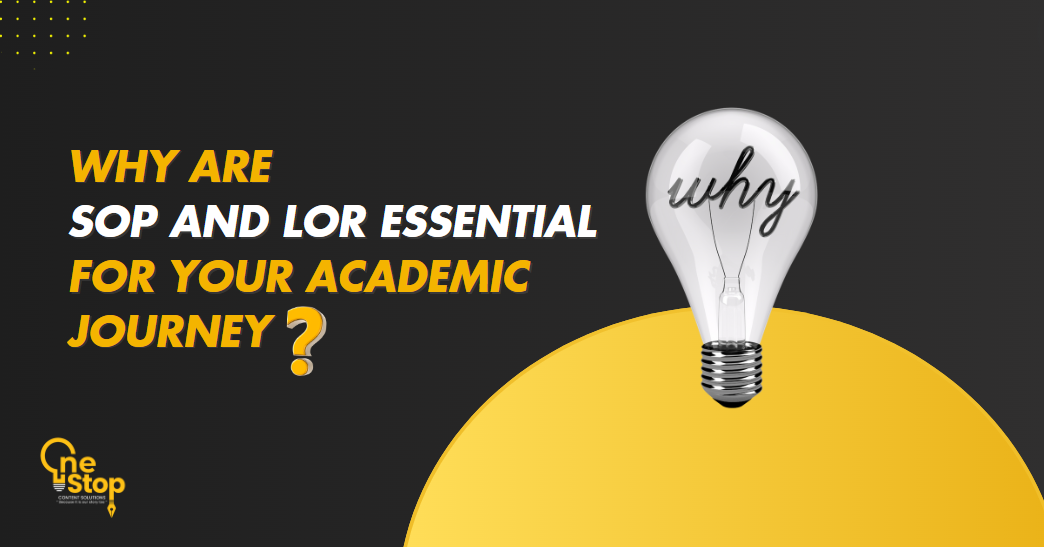Disclosing the Role of LOR and SOP in the Application Process
As you embark on the exciting journey of pursuing higher education or a Valued professional opportunity, two essential components often hold the key to unlocking your dreams: the Statement of Purpose (SOP) and the Letter of Recommendation (LOR). These seemingly simple documents carry immense weight in the application process, serving as powerful tools for showcasing your potential, passion, and fit for the desired program or position.
Distinguishing Between SOP and LOR
Key Contrasts: Purpose, Content, and Authorship
While both the SOP and LOR play pivotal roles in your application, it’s crucial to understand their distinct purposes, content, and authorship. The SOP is a personal statement crafted by you, the applicant, highlighting your academic and professional aspirations, achievements, and reasons for pursuing the particular program or opportunity. On the other hand, the LOR is a detailed evaluation written by a trusted mentor, professor, or employer, certifying to your abilities, character, and potential for success.
The Critical Significance of SOP and LOR
Showcasing Your Fit for the Program
The SOP serves as a powerful platform for you to demonstrate your alignment with the program’s values, goals, and intellectual pursuits. It allows you to articulate your motivations, research interests, and how your unique background and experiences have shaped your academic journey. By crafting a compelling SOP, you can effectively convey your passion, intellectual curiosity, and readiness to contribute to the program’s community.
Providing Comprehensive Evaluations
Complementing the SOP, the LOR offers an objective, third-party perspective on your abilities, achievements, and character traits. These letters provide invaluable insights into your academic aptitude, work ethic, leadership qualities, and overall potential for success. A well-crafted LOR can highlight your strengths, address any potential weaknesses, and reinforce the claims made in your SOP, adding credibility and depth to your application.
Need a standout SOP or LOR? Contact us now.
Formatting differences : SOP vs. LOR
Structure and Style Guidelines
While the content of the SOP and LOR differs significantly, both documents adhere to specific formatting and stylistic guidelines. The SOP usually follows a structured layout, including a start, body sentences, and a finish, enabling you to communicate your story and aims effectively! On the other hand, LORs often follow a more flexible format, with the author highlighting your strengths, achievements, and anecdotal examples that support their recommendation.
Word Count and Length Considerations
Word count and length are crucial considerations for both the SOP and LOR. While SOPs may range from 500 to 1000 words, depending on the program’s requirements, LORs are generally shorter, typically ranging from one to two pages. Striking the right balance between briefness and depth is crucial, as the admissions committee often inspects many applications in a restricted timeframe!
Get the latest insights on SOP and LOR trends: Standing Out in the MBA Crowd: Personalization Techniques for SOPs with Sample SOP for MBA pdf.
Exploring the Different Types of Recommendation Letters (LORs)
Academic vs. Professional LORs
When it comes to LORs, there are two main categories: academic and professional. Academic LORs are generally acquired from teachers or educators who have worked closely with you and attest for your academic skills, smarts, and chance for victory in a certain study area. Professional LORs, on the other hand, are provided by employers or supervisors who can speak to your work ethic, leadership skills, and professional achievements.
Subject-Specific vs. General LORs
Additionally, LORs can be subject-specific or general. Subject-specific LORs focus on your performance and potential within a particular academic discipline or area of study, while general LORs offer a broader perspective on your overall character, work ethic, and interpersonal skills.
Varieties of SOPs and Their Applications
Program-Specific vs. General SOPs
Similar to LORs, SOPs can be tailored to specific programs or serve as more general statements of purpose. Program-specific SOPs are carefully crafted to align with the unique requirements, goals, and focus of a particular program, highlighting your fit and enthusiasm for that specific area of study. General SOPs, on the other hand, provide a broader overview of your academic journey, achievements, and aspirations, allowing for greater flexibility in applications across multiple programs or institutions.
SOPs for Different Academic Levels
SOPs are not limited to graduate or professional school applications; they can also be required for undergraduate programs, fellowships, scholarships, or internships. The content and focus of an SOP may vary depending on the academic level and the specific opportunity you are pursuing. For instance, an undergraduate SOP may emphasize your intellectual curiosity, extracurricular activities, and future career aspirations, while a graduate-level SOP would delve deeper into your research interests, academic achievements, and potential contributions to the field.
Transform your SOP into a powerful career tool with our professional sop services.
Frequently Asked Questions:
What is an LOR (Letter of Recommendation)?
Why are LORs Important in Applications?
LORs play a crucial role in the application process. They provide an objective, third-party evaluation of your abilities, character, and potential for success. They lend credibility and depth to your application, allowing admissions committees to gain valuable insights from trusted mentors, professors, or employers.
Who Should Provide an LOR?
Generally, they suggest getting recommendations from folks who worked closely near you. These individuals should talk about their academic or professional successes, efforts at work, and personal traits. Ideal candidates for providing LORs include professors or instructors who have taught you in relevant coursework, academic advisors or mentors, and employers or supervisors who have directly overseen your work.
What Should an Effective LOR Include?
An effective LOR should provide specific examples and anecdotes that illustrate your strengths, achievements, and potential for success. It should highlight your academic or professional abilities, work ethic, leadership qualities, and any unique traits or experiences that set you apart from other applicants. Additionally, a well-crafted LOR should address any potential weaknesses or challenges you have faced and how you overcame them.
What is an SOP (Statement of Purpose)?
Why is an SOP Crucial for Academic Applications?
The SOP is a critical component of academic applications as it allows you to personally articulate your motivations, goals, and fit for the desired program or opportunity. It serves as a platform for you to showcase your passion, intellectual curiosity, and how your unique background and experiences have shaped your academic journey.
What Should Be Covered in an SOP?
An effective SOP should cover several key elements, including your academic and professional background, research interests or areas of focus, reasons for pursuing the particular program, and how your skills and experiences align with the program’s goals and values. Additionally, the SOP should highlight your future aspirations and how the program will contribute to your personal and professional growth.
How to Structure an Impactful SOP?
A well-structured SOP typically consists of an introduction that captures the reader’s attention and provides an overview of your goals, a body section that delves into your background, achievements, and motivations, and a conclusion that backs your fit for the program and reiterates your enthusiasm. Clear organization, strong writing skills, and a compelling narrative are essential for crafting an impactful SOP.
LOR vs. SOP: Understanding the Differences
How Do the Purposes of LOR and SOP Differ?
While both the LOR and SOP play vital roles in the application process, their purposes differ significantly. The LOR serves as an objective, third-party evaluation of your abilities and potential, while the SOP is a personal statement that allows you to directly convey your motivations, goals, and fit for the program or opportunity.
What Are the Content Distinctions Between LOR and SOP?
The content of an LOR and an SOP differs substantially. A LOR focuses on providing specific examples, anecdotes, and evaluations of your academic or professional achievements, work ethic, and character traits. An SOP is a narrative that highlights the backgrounds, research interests, and goals, along with how unique experiences and qualities align with the programs ‘ values.
Who Authors an LOR and an SOP?
The authorship of an LOR and an SOP is a key distinction. A LOR is written by a trusted mentor, professor, or employer who can provide an objective assessment of your abilities and potential. On the other hand, the SOP is a personal statement crafted entirely by you, the applicant, allowing you to directly convey your voice, aspirations, and fit for the program.
Best Practices for Crafting Compelling LORs and SOPs
Tips for Requesting Effective LORs
To ensure you receive effective LORs, it’s essential to carefully select recommenders who have directly observed your academic or professional performance and can provide specific examples and insights. Provide your recommenders with ample time and clear guidelines, such as your resume, transcripts, and a description of the program or opportunity you are applying for. This information will help them tailor their letters to highlight your relevant qualifications and potential for success.
Strategies for Writing a Standout SOP
When crafting your SOP, it’s crucial to strike a balance between showcasing your unique experiences and aligning with the program’s values and goals. Conduct thorough research on the program to understand its mission, areas of focus, and expectations. Tailor your SOP accordingly, highlighting how your background, research interests, and aspirations align with the program’s objectives.
Additionally, ensure your SOP is well-structured, engaging, and free of errors. Seek feedback from mentors, writing centers, or trusted individuals to refine your statement and make it truly compelling.
Common Pitfalls to Avoid in LORs and SOPs
While both LORs and SOPs are essential components of your application, there are common pitfalls to avoid. For LORs, ensure your recommenders have enough time to craft a detailed and thoughtful letter. Avoid requesting letters from individuals who may not know you well enough to provide a meaningful evaluation.
In your SOP, avoid generic or clichéd statements and exaggerating or misrepresenting your achievements or experiences. Instead, focus on showcasing your authentic self, highlighting your unique strengths, and demonstrating a passion for the program or opportunity.
Contact us to start enhancing your Professional Documents on our email: @onestopcontentsolutions.com contact no.: (+91) 8505 03 5130




